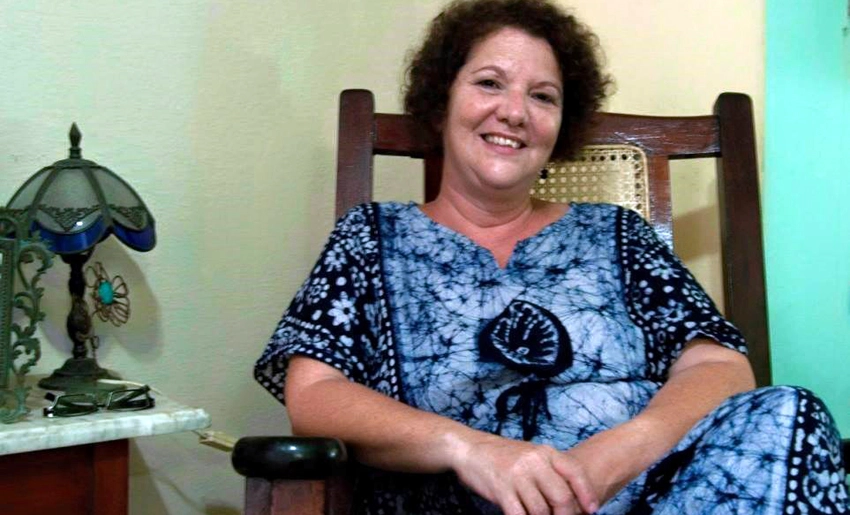“Poetry is knowledge, salvation, power, abandonment (…) Invitation to travel; return to the homeland. (…) Experience, feeling, emotion, intuition…”, says Octavio Paz at the doors of his book of essays El arco y la lira (The Bow and the Lyre), and such assertion of the great Mexican poet, Nobel Prize winner in Literature 1990, acquires a gravitation of excellence at the time of a notebook like Limpieza de sangre (Blood Cleaning), by Charo Guerra (Limonar, Matanzas, 1962), poetry of high verve that highlights with abundance such clarities.
It is good to remember, in the shadow of such an occasion, that the author of the title that originates this column, has in her favor other books that attest to her presence in the insular poetic map of recent years: Un sitio bajo el cielo (Ediciones Matanzas, 1991), Los inocentes (Ediciones Vigía, 1993), Vámonos a Icaria (Editorial Letras cubanas, 1998), and Luna de los pobres (Premio José Jacinto Milanés, Ediciones Matanzas, 2011), all notable for a vocation that knows how to join the learning of life and the intimacy of the word.
Winner of Julian del Casal Poetry Prize, awarded annually by the Union of Writers and Artists of Cuba -on this occasion corresponding to the 2020 edition, which has just seen the light of day as part of the programs of the Havana International Book Fair-, the collection of poems that motivates this column is also a very unique way of entering, from the private preserves of ancestry and lineage, into the limits where reminiscence unfolds like an album of old photos in the light of a candle.
And it is that the character of these poems, their outline of images that move shrewdly between the private and the public, their demarcation of profit that is affirmed sometimes in the past and sometimes in the adjacent, makes one think immediately -and not only by the rhythmic pace of a verbal display in which past and present are coupled and change roles- in some remote nights of the Creole houses, just with the lighting warned for the complacency of the good look.
It is there when the gaze braids, page after page of the poetic notebook that has become a familiar sample book, the possible of a journey that expands in images like sparkling photos and cautious daguerreotypes, that Charo Guerra’s poetry reveals her way of turning the predictable into an element of the unsuspected and vice versa: tact to probe feelings and relate them far from any circumstantial conceit, sanity so that the verses do not get upset and take an ill-advised route.
In that layout, the title itself is a warning, Limpieza de sangre, an expression that in distant centuries fixed implacable rules against the mixture of races -exclusion for some, boasting for others-, had in the insular limits not few and bellicose reviews, violent usurpations and bitter disputes, which in the case of these poems, undertake an inverse route: it is not a matter of endorsing that a clean ancestry is pressing, but rather that there is no lineage open to the most surprising paths affixed in such a blunder.
This is how Charo Guerra firmly bets on glossing from the very reverse of the pretended “cleanliness” -or rather in its antipodes- what Fernando Ortiz pointed out in El engaño de las razas: “An individual may seem pure, unite with others also apparently pure and reproduce for generations his current type as manifest purity; and, nevertheless, carry hidden impurity in his gene pool, through an accumulation of recessive genes, hidden on the lookout for the opportune occasion to externalize its presence”.
The texts of Limpieza de sangre, written at the foot of a fiery remembrance, as a way out of that enunciated stalking, corroborate the impure when it is established as the saint and sign of the path that demarcates a different purity, sum and observance of a long and winding road, time of other less emphatic but more peremptory foundations: “The iron decomposes, /its intimate substances liquefy /and the emulsion corrodes the architecture of inclemency /with which the machine of seeing was designed”.
There are eighteen poems that make up this notebook; postcards of an endearing album where blood -beyond ablutions and disputes- floods everything, a voice that never faints, and seems to come from the most remote horizons, to travel to the bottom of the night: Life, love, family, time, death, home, solitude… Seven examples of excellence are Limpieza de sangre, La casa, Holograma del trópico, Saludo familiar, Oyendo a Barbra Streisand, Apuntes para un mensaje and that jewel that is La hora de la cena.
Poetry of memory that looks into the interiors of the family, the routes of their ancestors, the genealogies and their unknowns; poetry in which characters and scenarios, sometimes seem to come out of an insomnia as indocile as pressing, and other times as if escaped from a hallucination as proven as surprising; poetry carried from beginning to end with certainty and gentleness, not without perspicacity, is confirmation of a well conducted craft: so delivers Charo Guerra and her Limpieza de sangre.
- Maggie Mateo returns as a storyteller - 21 de May de 2025
- Farewell to Mario, Don Miguel’s disciple - 16 de April de 2025
- The savage detective and the unsubmissive translator - 7 de April de 2025

